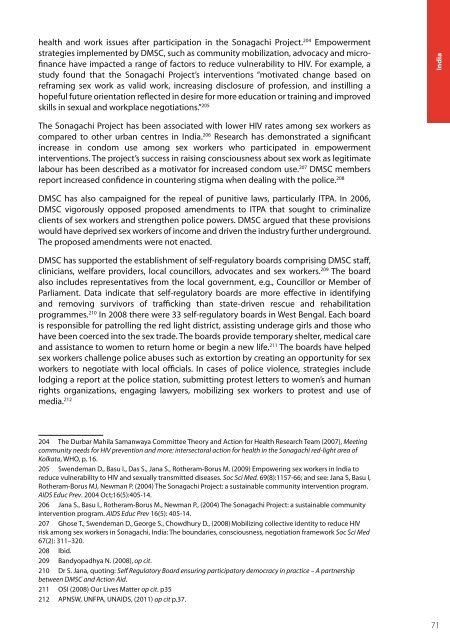SEX WORK AND THE LAW - HIV/AIDS Data Hub
SEX WORK AND THE LAW - HIV/AIDS Data Hub
SEX WORK AND THE LAW - HIV/AIDS Data Hub
Create successful ePaper yourself
Turn your PDF publications into a flip-book with our unique Google optimized e-Paper software.
health and work issues after participation in the Sonagachi Project. 204 Empowerment<br />
strategies implemented by DMSC, such as community mobilization, advocacy and microfinance<br />
have impacted a range of factors to reduce vulnerability to <strong>HIV</strong>. For example, a<br />
study found that the Sonagachi Project’s interventions “motivated change based on<br />
reframing sex work as valid work, increasing disclosure of profession, and instilling a<br />
hopeful future orientation reflected in desire for more education or training and improved<br />
skills in sexual and workplace negotiations.” 205<br />
India<br />
The Sonagachi Project has been associated with lower <strong>HIV</strong> rates among sex workers as<br />
compared to other urban centres in India. 206 Research has demonstrated a significant<br />
increase in condom use among sex workers who participated in empowerment<br />
interventions. The project’s success in raising consciousness about sex work as legitimate<br />
labour has been described as a motivator for increased condom use. 207 DMSC members<br />
report increased confidence in countering stigma when dealing with the police. 208<br />
DMSC has also campaigned for the repeal of punitive laws, particularly ITPA. In 2006,<br />
DMSC vigorously opposed proposed amendments to ITPA that sought to criminalize<br />
clients of sex workers and strengthen police powers. DMSC argued that these provisions<br />
would have deprived sex workers of income and driven the industry further underground.<br />
The proposed amendments were not enacted.<br />
DMSC has supported the establishment of self-regulatory boards comprising DMSC staff,<br />
clinicians, welfare providers, local councillors, advocates and sex workers. 209 The board<br />
also includes representatives from the local government, e.g., Councillor or Member of<br />
Parliament. <strong>Data</strong> indicate that self-regulatory boards are more effective in identifying<br />
and removing survivors of trafficking than state-driven rescue and rehabilitation<br />
programmes. 210 In 2008 there were 33 self-regulatory boards in West Bengal. Each board<br />
is responsible for patrolling the red light district, assisting underage girls and those who<br />
have been coerced into the sex trade. The boards provide temporary shelter, medical care<br />
and assistance to women to return home or begin a new life. 211 The boards have helped<br />
sex workers challenge police abuses such as extortion by creating an opportunity for sex<br />
workers to negotiate with local officials. In cases of police violence, strategies include<br />
lodging a report at the police station, submitting protest letters to women’s and human<br />
rights organizations, engaging lawyers, mobilizing sex workers to protest and use of<br />
media. 212<br />
204 The Durbar Mahila Samanwaya Committee Theory and Action for Health Research Team (2007), Meeting<br />
community needs for <strong>HIV</strong> prevention and more: intersectoral action for health in the Sonagachi red-light area of<br />
Kolkata, WHO, p. 16.<br />
205 Swendeman D., Basu I., Das S., Jana S., Rotheram-Borus M. (2009) Empowering sex workers in India to<br />
reduce vulnerability to <strong>HIV</strong> and sexually transmitted diseases. Soc Sci Med. 69(8):1157-66; and see: Jana S, Basu I,<br />
Rotheram-Borus MJ, Newman P. (2004) The Sonagachi Project: a sustainable community intervention program.<br />
<strong>AIDS</strong> Educ Prev. 2004 Oct;16(5):405-14.<br />
206 Jana S., Basu I., Rotheram-Borus M., Newman P., (2004) The Sonagachi Project: a sustainable community<br />
intervention program. <strong>AIDS</strong> Educ Prev 16(5): 405-14.<br />
207 Ghose T., Swendeman D., George S., Chowdhury D., (2008) Mobilizing collective identity to reduce <strong>HIV</strong><br />
risk among sex workers in Sonagachi, India: The boundaries, consciousness, negotiation framework Soc Sci Med<br />
67(2): 311–320.<br />
208 Ibid.<br />
209 Bandyopadhya N. (2008), op cit.<br />
210 Dr S. Jana, quoting: Self Regulatory Board ensuring participatory democracy in practice – A partnership<br />
between DMSC and Action Aid.<br />
211 OSI (2008) Our Lives Matter op cit. p35<br />
212 APNSW, UNFPA, UN<strong>AIDS</strong>, (2011) op cit p.37.<br />
71
















